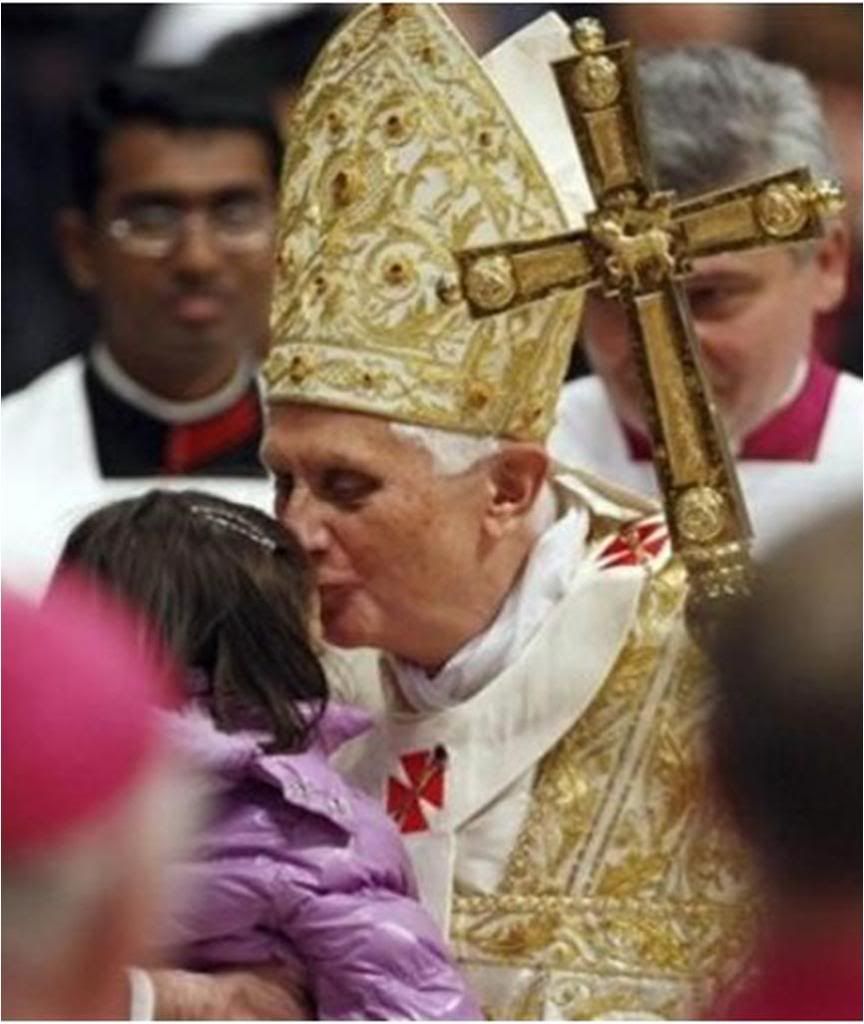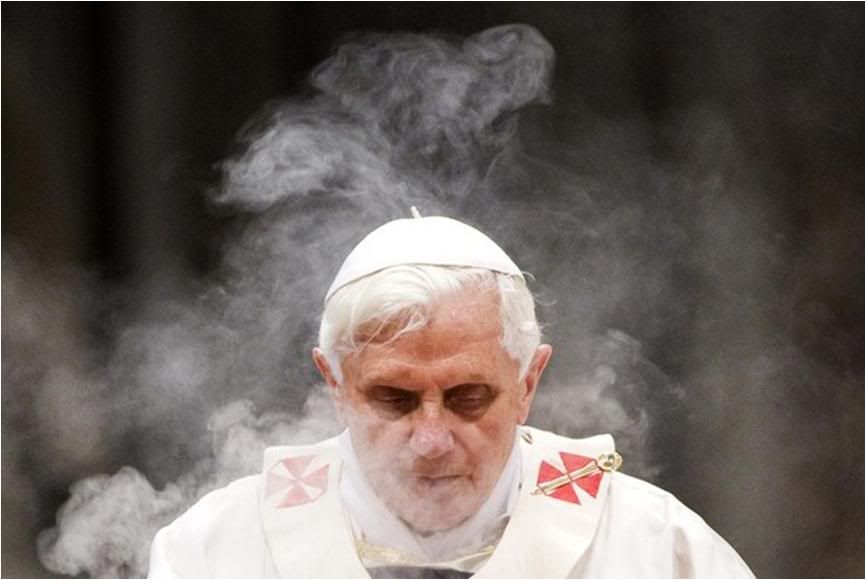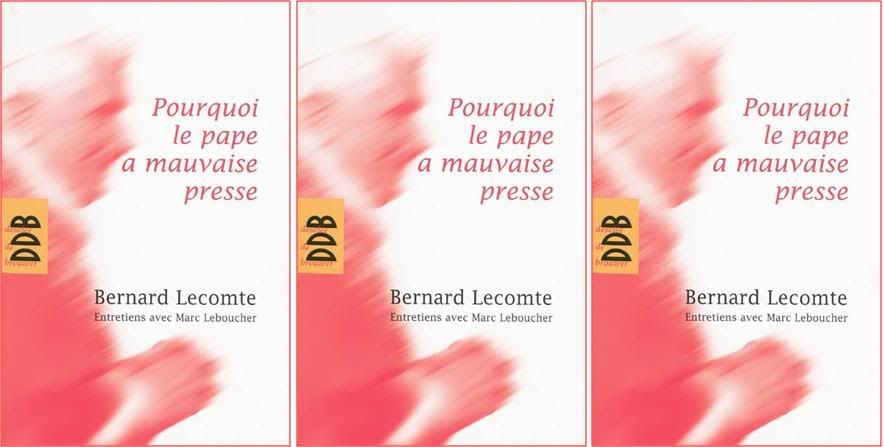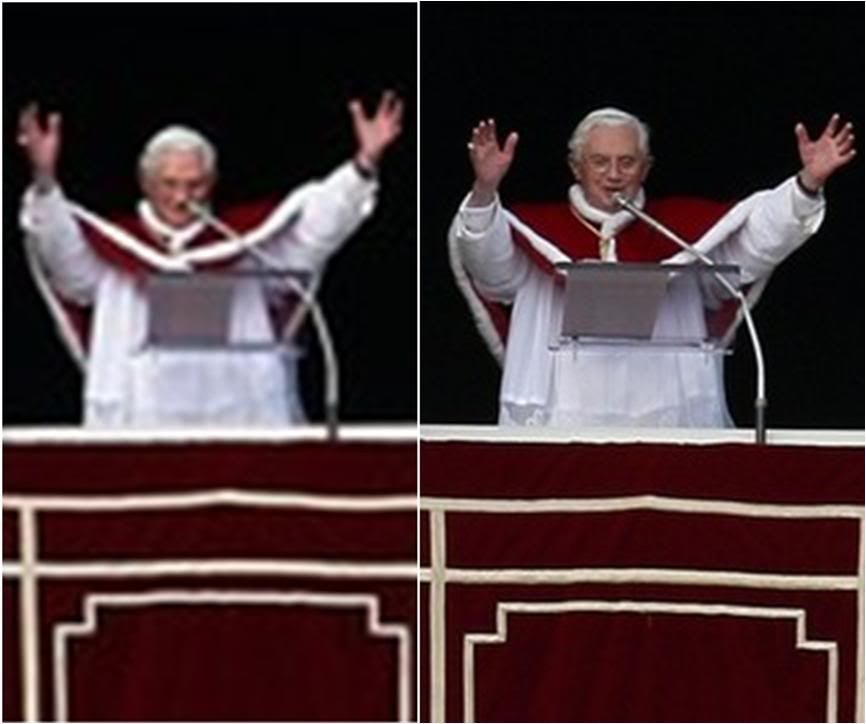 On her site
On her site
 http://benoit-et-moi.fr/
http://benoit-et-moi.fr/
Beatrice has flagged at least three articles from the French media that deserve dissemination,
I will translate one at a time.
 The Pope kisses a child who was plucked from an aisle and taken to him by Inspector Giani after the Mass of the Epiphany.
2010 in the school of Benedict XVI:
The Pope kisses a child who was plucked from an aisle and taken to him by Inspector Giani after the Mass of the Epiphany.
2010 in the school of Benedict XVI:
Courage, lucidity, serenity
Editorial
by Philippe Oswald
Translated from

Issue for 1/9/2010
The Church and the Pope were very much in the news in 2009. Less, alas, to greet the essential text for our time that the encyclical
Caritas in veritate is, or to underscore the importance of the Year for Priests, than to fashion a crown of thorns for the head of the Church.
That was the work of those who raised the loudest hue and cry against the Pope after episodes as different as the lifting of the ecommunication of the Lefebvrian bishops and the disclosures about Bishop Williamson, the abortion of a nine-year-old girl's rape pregnancy in Brazil, or the Pope's statements about condoms and AIDS.
And no holiday reprieve for him, either! He continued to be the target of convergent attacks in the final days of the year, after he signed the decree proclaiming the heroic virtues of Pius XII which opens the way towards the beatification of this great Pope.
Finally, the physical aggression on Christmas Eve by a deranged woman seemed to be a symbolic of all the outrageous affronts that the Holy Father has had to bear.
All the more reason to underscore the courage and serenity that the Pope has always shown, even after this last event.
"It's not the end of the world," he is quoted to have said after he got back on his feet, still with his usual smile.
Physical courage, because he refuses to give up, for security reasons, opportunities to get close to the faithful during his public appearances.
Intellectual and moral courage, for having banished doublespeak and stonewalling from the Magisterium as well as from his governance of teh Church: the severity of his condemnation for the sexual crimes committed by some priests in Ireland was followed by the resignation of the bishops who had thought it preferable to cover up the offenses.
Let us not look any farther for an example to follow in 2010. Catholics of France, we are faced by an unheard-of spiritual and moral crisis best testified to by the vertiginous fall of attendance at Sunday Mass - barely 4% of potential Massgoers according to the latest survey by La Croix (published 12/28/09).
Let us have the courage to face this collapse and to faithfully seek out its causes. How do we live our faith? Are we cultivating it through prayer and study, to spread it through our life, to bear witness to it by our joyous hope?
Finally, the single most important thing. Leon Bloy once wrote, "There is only one sorrow - that we are not saints".
Given Mr. Oswald's final sentence, I am surprised that he did not include holiness among the traits that one can learn in 'the school of Benedict XVI'.
I was always very moved, reading about reactions to his election as Pope in April 2005, whenever the respondent - from cardinal electors to shopkeepers who saw him casually - said that one of the most obvious traits about Joseph Ratzinger was his holiness. Something not even his detractors - except the malicious - have disputed or can dispute.
His Magisterium has consistently and insistently been about the quest for God for those who do not have faith, and the quest for holiness - to live in imitation of Christ - for those who are already in the faith, especially priests and bishops who should set the example as the saints do. And as the Vicar of Christ does in everything that we see, read or hear about him.
BENEDICTUS QUI VENIT IN NOMINE DOMINI.
 From the Mass on January 1, 2010.
The following article is by Chantal Delsol (born 1947), a French philosopher who describes herself as a liberal neo-conservative. She was elected in 2007 to the Academie des Sciences Morales et Politique of the Institut de France, the same academy to which Cardinal Joseph Ratzinger was elected in 1991 to the seat of Andrei Sakharov, when the Russian physicist died. Delsol is an editorialist for both le Figaro and Valeurs Actuelles.
From the Mass on January 1, 2010.
The following article is by Chantal Delsol (born 1947), a French philosopher who describes herself as a liberal neo-conservative. She was elected in 2007 to the Academie des Sciences Morales et Politique of the Institut de France, the same academy to which Cardinal Joseph Ratzinger was elected in 1991 to the seat of Andrei Sakharov, when the Russian physicist died. Delsol is an editorialist for both le Figaro and Valeurs Actuelles.
The following is her commentary on a recent book by Bernard Lecomte, a prominent journalist (he has been editor-in-chief of Le Figaro) and author of several books - including 3 on John Paul II, and one on Benedict XVI [Benoit XVi, le dernier pape europeen, 2006]: Why the Pope has a bad press.
 What struck me about this was Lecomte's conceit in using an interview format for the book - a la Vittorio Messori with Cardinal Ratzinger and John Paul II, and Peter Seewald (twice) with Cardinal Ratzinger. His interviewer is Marc Leboucher, about whom I cannot find a complete biodata online, not even in French, but who apparently won a 2008 Prize for Religious Literature for co-authoring a book entitled La théologie au XXe siècle et l'avenir de la foi (Theology in the 20th century and the future of faith). Leboucher previously collaborated with Lecomte for a 2004 book on John Paul II.
What struck me about this was Lecomte's conceit in using an interview format for the book - a la Vittorio Messori with Cardinal Ratzinger and John Paul II, and Peter Seewald (twice) with Cardinal Ratzinger. His interviewer is Marc Leboucher, about whom I cannot find a complete biodata online, not even in French, but who apparently won a 2008 Prize for Religious Literature for co-authoring a book entitled La théologie au XXe siècle et l'avenir de la foi (Theology in the 20th century and the future of faith). Leboucher previously collaborated with Lecomte for a 2004 book on John Paul II.
It still perplexes me why an 'important' writer would devote 264 pages to why the Pope has a bad press. It may have sociological value, but it's can't be anything other than morbid. If the book had been about why the press is so generally bad today, he could produce an endlessly encycopledic work just citing the deluge of examples every day!
The courage to displease
by Chantal Delsol
Translated from

January 7, 2010
Valeurs actuelles is a weekly journal of culture and politics and is considered generally conservative.
The Pope has a bad press - yes, the whole world knows that. But what's behind it?
Is it that the Church, through him, gets a bad press? Or is it a problem with the Pope aa an authority figure>? This is the question that the author of a book attempts to answer in in the form of interviews with his editor Marc Laboucher.
Popes in our day live in a world of the media. They must think of their 'image'. John Paul II had the gift of seduction. Which is nonetheless not essential: Does fatih have anything to do with seduction?
Even if some form of charisma can play a role in pastoral care, so much more is needed. However, whether he wants to or not, a Pope in our day has, in some way, an image to defend.
Pope Benedict's image in the media depends on several facts. Before he became Pope, Joseph Ratzinger was Prefect of the Congregation for the Doctrine of the Faith, successor to the Office of the Inquisition. Which gives journalists a perverse thrill.
His discourses against nihilism and relativism confirm their image of him: because he is conservative, the media also describe him as a fundamentalist
['integriste' is the French term] .
When he was elected Pope, the media had a nauseating feast. As he is German, he was conscripted at age 14 into the Hitler Youth. His teenage photo in uniform was used endlessly, as in a loop, as if to say the Holy Spirit had elected a Nazi Pope.
The
reductio ad Hitlerum is the final argument of so many imbeciles, and the media Guignols
['les Guignols de l'info' also happens to be a satirical puppet show on French TV) have even called him Adolf II.
In other words, because he is conservative, Benedict XVI is a Nazi - that's the refrain. But, as Bernarde Lecomte asks, can a Pope be anything but conservative? In the sense that he must be the guardian of the Church's dogma, for after all, the Church is an institution.
But it is more than that, I would say, because the Church must defend, against all odds, after Christ, the image of man that modernity wishes to discard in favor of the new artificial man, constructed by our own rormethean will - and perhaps worthy of the monstrous whims of a Frankenstein.
The fact is that the media animus against the present Pope is particularly lively in France, where the religious culture has practically dropped below zero, and where the anti-religious culture has acquired its letters of nobility.
When a Pope comes to France, the media unleash their reproval of the authorities for the cost of the visit. There is a strong anti-Crhistianity in our land, born from militant secularism, to which a conservative Pope is more exposed.
Contemporary society, which has no use for religion except for human rights, nonetheless understands such rights as exclusively individualist. To respect rights means to respect the desires of each individual, without regard to whether such desires are aberrant, unnatural, or even criminal.
And that is why the Church's discourse on morality is considered a slap, a major provocation. Morality is imposed from the outside by laws or commandments that we have not made, and this impugns contemporary man's sense of omnipotence.
And yet, when the Pope, to all-around indignation in the media, spoke about condoms and AIDS in Africa, the African governments who know their business [about fighting AIDS] confirmed what the Pope said.
Then there's the fact that this Pope is an intellectual, and in this respect, is not reticent at all about expressing his reflections, seeking objectivity rather than conensual acquiescence.
And when he speaks of Islam, he knows he may displease some but he also must speak the truth. Forgetting perhaps, that as Pope, he would be challenged by bellicose interpretations of his statements.
Bernard Lecomte rightly points out that the Pope's bad press comes from the fact that, in general, he does not say the things the media expect him to say. But it is comical to see Marc Leboucher strike
a high note against sheeplike political correctness, when in his own life, he manifests pure panic at not thinking like the rest of the world.
In the era of Communist, we had Jean Paul II, a soldier [?], when it was a soldier we needed most. Now, the challenge is no longer to fight a totalitarianism that was venerated even my many of our peers, but to repel a nihilism that threatens to sweep oru own children into its dragnets.
Benedict XVI is providential for facing that challenge. He will be criticized relentlessly, and we Catholics as well. Let us hope this ongoing blame will develop our sense of humor rather than bitterness. That's the best one can hope for.
 From the January 6 Angelus. For some reason, there were no close shots taken of the Pope - these are cropped from the 'long shot' pictures and enlarged, hence the poor resolution, particularly the one on the left.
From the January 6 Angelus. For some reason, there were no close shots taken of the Pope - these are cropped from the 'long shot' pictures and enlarged, hence the poor resolution, particularly the one on the left.
[Modificato da TERESA BENEDETTA 08/01/2010 17:25]